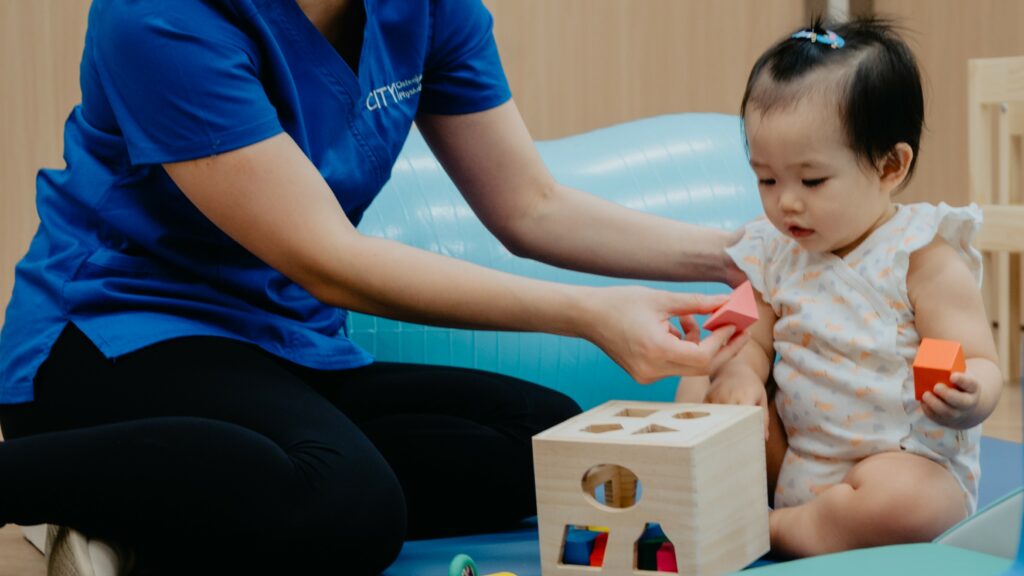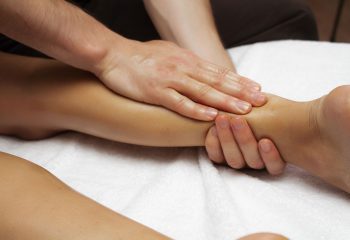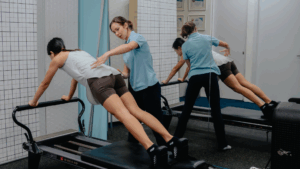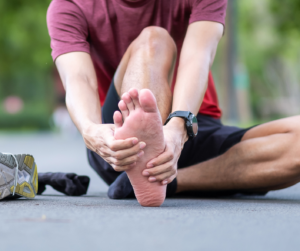Fine motor skills are an essential component of a child’s growth and development, influencing their ability to perform everyday tasks with precision and coordination. In this comprehensive guide, we’ll delve into what fine motor skills are, why they matter in child development, and how they impact cognitive growth. We’ll also explore when parents should be concerned about their child’s fine motor development, the importance of early intervention, common milestones for different age groups, activities to enhance fine motor skills, and the role of occupational therapy. If you’re looking to support your child’s fine motor skill development, you’ve come to the right place.
What are fine motor skills?
Fine motor skills encompass a range of abilities that involve the precise coordination of small muscles in the hands and fingers. These skills are essential for performing tasks that require dexterity, control, and accuracy, such as picking up small objects, writing, buttoning a shirt, or using cutlery. Developing fine motor skills is a gradual process that begins in infancy and continues to evolve throughout childhood.
What is the difference between fine motor and gross motor skills?
Fine motor skills involve the use of small muscles in the hands and fingers for precise movements. In contrast, gross motor skills involve the use of larger muscles for activities like running, jumping, and throwing. While fine motor skills are essential for tasks requiring precision, gross motor skills are crucial for activities that involve whole-body movement and coordination.
How do fine motor and gross motor skills relate to each other?
Fine motor and gross motor skills are interconnected and often develop simultaneously. For example, when a child learns to crawl or walk (gross motor skills), they also improve their balance and coordination, which can indirectly benefit their fine motor skills. Additionally, fine motor skills, such as reaching and grasping, are essential for exploring the world and developing gross motor skills as children interact with their environment.
Tip: Learn more about gross motor skills in our guide on “Gross motor skills for infants & toddlers”!
Why are fine motor skills important in child development?
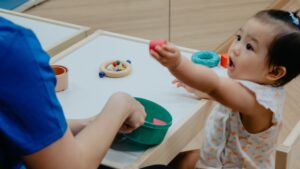
Fine motor skills are fundamental for several reasons:
- Academic success: Proficient fine motor skills are essential for tasks such as writing, drawing, and manipulating objects. Children with well-developed fine motor skills tend to excel in school activities that require precision.
- Independence: Fine motor skills enable children to perform self-care tasks independently, such as dressing, feeding themselves, and tying shoelaces.
- Social and emotional development: Activities like drawing or crafting promote self-expression and creativity, contributing to a child’s emotional development and self-esteem.
- Physical coordination: Fine motor skills are closely linked to hand-eye coordination, which is vital for sports and recreational activities.
- Problem solving: Developing fine motor skills enhances a child’s ability to solve problems and think critically, as they learn to manipulate objects and tools effectively.
How does fine motor skill development impact overall learning and cognitive growth?
Fine motor skill development is closely intertwined with cognitive growth. Here’s how it affects various aspects of a child’s learning:
- Improved concentration: Fine motor activities require focus and concentration, which can translate into better attention span in academic settings.
- Language and communication: The fine motor skill of grasping and manipulating objects also strengthens the muscles involved in speech and language development.
- Spatial awareness: Activities like puzzles and building with blocks enhance a child’s understanding of spatial relationships and geometry.
- Mathematical abilities: Counting, sorting, and arranging objects are all fine motor activities that lay the foundation for mathematical concepts.
- Creativity and problem solving: Fine motor activities stimulate creativity and encourage children to find innovative solutions to problems.
When should parents be concerned about their child’s fine motor development?
While fine motor skill development is a gradual process, there are certain milestones children typically reach at different ages. If your child is not meeting these milestones, it may be a cause for concern.
Why is early intervention crucial for fine motor skills challenges?
Early intervention is critical for several reasons:
- Maximising potential: Early intervention can help a child reach their full potential by addressing fine motor challenges before they impact other areas of development.
- Preventing frustration: Struggling with fine motor tasks can lead to frustration and reduced self-esteem. Early intervention can mitigate these negative emotions.
- Academic preparedness: Addressing fine motor challenges early on ensures that a child is academically prepared for school, where writing and other fine motor skills become increasingly important.
- Holistic development: Early intervention programs often include activities that support overall development, not just fine motor skills. This can lead to improved outcomes in various areas of a child’s life.
What are common fine motor milestones for different age groups?
Understanding typical fine motor milestones for different age groups can help parents gauge their child’s development and identify potential challenges. Here are some common milestones:
Infants (Aged 0-2):
The first years of a child’s life are marked by remarkable growth and development, especially when it comes to fine motor skills. These early achievements lay the foundation for more complex tasks in later stages of life. These milestones are not just markers of development but also windows into how your little one is beginning to interact with and understand the world around them. Here’s what to expect:
- Begins to visually track objects with their eyes.
- Reflexively grasps objects placed in their palm.
- Develops the ability to reach for and hold objects voluntarily.
- Starts transferring objects from one hand to another.
- Exhibits the pincer grasp, using thumb and forefinger to pick up small items.
- Can bang objects together and purposefully drop items.
Tip: Learn more about your baby milestones with our Developmental Milestones Assessment and find out what are some of the newborn and infants conditions that our paediatric specialists can address here at City Osteopathy & Physiotherapy.
Toddlers (Aged 2-6):
During the toddler years, children experience significant growth in their fine motor skills. These milestones mark crucial steps in their development, enabling them to become more independent and creative. Here are some notable fine motor milestones for toddlers aged 2 to 6:
- Begins scribbling with crayons or markers.
- Can stack several blocks to build simple towers.
- Feeds themselves using fingers or a spoon.
- Refines drawing skills to create basic shapes and more controlled lines.
- Successfully threads large beads onto a string.
- Demonstrates improved buttoning and zipping skills.
- Draws recognisable pictures and writes some letters.
- Develops more advanced scissor skills.
- Demonstrates hand preference (left or right-handed).
Tip: Find out more about what are some toddler conditions that our paediatric physiotherapists can help address!
Adolescents & Children (Aged 6-16):
As children grow and transition into adolescence, their fine motor skills continue to develop and become increasingly refined. This phase of development is marked by significant progress in various aspects of fine motor control, from enhancing handwriting to mastering intricate crafts. Here, we delve into the milestones that children aged 6-16 can achieve in their journey towards fine motor skill mastery:
- Achieves more refined handwriting and drawing abilities.
- Gains better control over intricate crafts like origami.
- Improves hand-eye coordination through sports and activities.
- Refines hand skills for complex tasks like typing and playing musical instruments.
- Develops more precise cutting and crafting abilities.
- Enhances fine motor skills in specific hobbies and interests.
- Demonstrates advanced fine motor skills required for academic work, such as essay writing and detailed drawing.
Tip: Find out what are some of the children and adolescent’s conditions that our paediatric specialists can help to address!
Understanding these milestones for different age groups allows parents and caregivers to celebrate their child’s achievements, identify potential challenges, and provide the necessary support. As children navigate each stage of fine motor development, they embark on a journey of growth, self-discovery, and skill mastery that will serve them well throughout their lives.
What are the at-home activities that can help with fine motor improvement?
Parents can play a significant role in supporting their child’s fine motor skill development through various activities and techniques. Here are some effective strategies:
What techniques can parents implement at home to support fine motor skill development?
- Playdough play: Squishing, rolling, and shaping playdough helps strengthen hand muscles and improve dexterity.
- Puzzles: Age-appropriate puzzles challenge children’s problem-solving skills and fine motor control.
- Drawing and colouring: Encourage drawing, colouring, and tracing to enhance hand-eye coordination.
- Fine motor toys: Invest in toys like building blocks, beads, and threading activities that require precise hand movements.
- Scissor skills: Supervised scissor activities, like cutting paper, promote bilateral coordination and fine motor control.
- Cooking and baking: Involving children in simple cooking tasks, such as mixing, pouring, and cutting, enhances fine motor skills.
- Outdoor play: Activities like digging in sand, playing with water, and climbing help children develop gross and fine motor skills simultaneously.
How can our paediatric physiotherapists assess and monitor fine motor skills?

Here at City Osteopathy and Physiotherapy with our paediatric physiotherapists, we employ various assessment tools and strategies to evaluate and monitor fine motor skills in children. These assessments help us understand a child’s strengths and areas that may require intervention or support.
Here’s what to expect at a Developmental Milestones Assessment session with us:
- Assessment for Age-Appropriate Development: This assessment includes the Peabody Developmental Motor Scales (PDMS), which evaluates the quality and fine-ness of your baby’s movements.
- Developmental Guide Brochure: To ensure you have a clear understanding of what to expect in the next phase of your baby’s development, we provide you with a comprehensive developmental guide brochure. This brochure outlines the milestones and growth patterns you can anticipate before your baby reaches their next developmental milestone.
- Play and Engagement Strategies: Our physiotherapists provide you with personalised guidance on how to play and engage with your baby effectively. These strategies are tailored to your baby’s specific developmental needs and enhancement.
- Age-Appropriate Toys for Development: Our physiotherapists will provide you with detailed recommendations on age-appropriate toys that are specifically designed to support various aspects of your baby’s development.
Book a Developmental Milestones Assessment with our paediatric physiotherapist and get your little one the care they need, naturally.
How can our paediatric physiotherapists help your child in the event that he or she has developmental delays?
Paediatric physiotherapy employs a variety of techniques to help babies with developmental delays overcome motor challenges and achieve their developmental milestones. These techniques are tailored to the specific needs of each child and are designed to promote motor skills, cognitive abilities, and social interactions. These techniques include:
- Motor skills therapy: Motor skills therapy is dedicated to enhancing a baby’s physical abilities, encompassing balance, coordination, strength, and mobility. It employs gentle stretches, range-of-motion exercises, balance training, and strength-building routines.
- Developmental exercises and techniques: These target distinct areas of development, including cognitive, fine motor, gross motor, and social skills. Physical therapists engage the child in play-based activities, interactive games, and sensory stimulation to stimulate growth.
- Sensory integration techniques: Sensory integration techniques aid infants in processing and responding appropriately to sensory input. These methods expose them to various textures, sounds, and movements, fostering suitable sensory responses.
- Movement facilitation techniques: The focus of movement facilitation techniques is to encourage normal movement patterns and postural control. These methods employ specific handling and positioning maneuvers to promote optimal motor development and overall functional improvement.
Learn more about how our paediatric physiotherapists can help in addressing your baby’s developmental delays.
Developing fine gross motor skills with paediatric physiotherapy
In conclusion, fine motor skill development is a crucial aspect of a child’s growth that influences their academic success, independence, and overall cognitive growth. Understanding the importance of fine motor skills, recognizing when early intervention is necessary, and supporting a child’s development through age-appropriate activities can make a significant difference in their abilities and confidence.
As an osteopathy and physiotherapy clinic specialising in babies and children, we are here to support you on this journey. If you have any questions or concerns about your child’s gross motor skills, don’t hesitate to book a consultation with our paediatric physiotherapist for a Development Milestones Assessment! Together, we can help your child reach their full potential!

